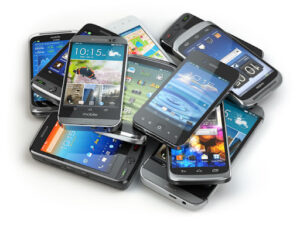From entrepreneurs working at their kitchen tables, to huge manufacturers employing thousands of workers, nearly all American businesses have one tool in common: Electronics. Cell phones and computers keep everyone connected. Machinery and appliances keep things running. Because electronics are part of every business, electronics recycling should be standard for every business. It’s the most sustainable, and often the easiest, way to manage electronic waste, or e-waste.
Managing your e-waste can be burdensome, especially when you have a lot of large or heavy items to get rid of. Electronics recycling is the most appropriate solution for getting rid of nearly anything with a power cord or on-switch. Your business’s old gadgets definitely don’t belong in the trash.
Why Electronics Recycling Matters
 Because electronics are made with heavy metals and chemicals that may leech into the environment when they’re landfilled, many states and municipalities have created laws around e-waste disposal. It’s in everyone’s best interest to keep things like mercury, cadmium and arsenic out of local landfills, where they can end up in the soil and groundwater and create health problems for people in the community. Depending on where you live, giving away or recycling electronics may be your only legal options for managing your business’s e-waste.
Because electronics are made with heavy metals and chemicals that may leech into the environment when they’re landfilled, many states and municipalities have created laws around e-waste disposal. It’s in everyone’s best interest to keep things like mercury, cadmium and arsenic out of local landfills, where they can end up in the soil and groundwater and create health problems for people in the community. Depending on where you live, giving away or recycling electronics may be your only legal options for managing your business’s e-waste.
There’s also a critical sustainability element involved with electronics recycling. Like with other kinds of recycling, recovering materials from used electronics minimizes the need to mine for virgin materials. Electronics often use precious metals that are expensive, difficult to mine and highly recyclable. Per the EPA, recycling 1 million cell phones recovers about 35,000 pounds of copper, 772 pounds of silver, 75 pounds of gold and 33 pounds of palladium.
What Happens During Electronics Recycling?
Before we dive into what kinds of electronics can be recycled, let’s address a common question that clients have: What actually happens to your broken or outdated devices after you turn them over to a recycler?
One of a few things might happen, depending on the condition of your electronics and the value of the components inside. Sometimes electronics recyclers can fix and resell items that are still functional. When that’s not possible, or wouldn’t be cost-effective, electronics get taken apart so the individual components can be separated by type. For example, ferrous metal will be sorted from non-ferrous metal. Circuit boards will be taken apart to recover the copper, palladium and other valuable metals that are used to build them. Once separated, these elements can be processed and sold to manufacturers. Components that can’t be efficiently recycled, such as plastic casing and plastic switches, may ultimately end up in landfills.
Electronics That Can (and Can’t) Be Recycled
Almost all types of common electronics can be at least partially recycled, since they’re made largely of metal. Cell phones, computers, tablets, printers, scanners, televisions, cameras, audio and video equipment, power tools, lamps and appliances such as microwaves, toasters and ovens are all generally recyclable. Depending on your industry, your business may use any number of other electric machinery that can be recycled.
Only a few specific types of electronics really can’t be recycled safely. Anything that might contain mercury or lead requires special handling as hazardous waste. LCD televisions and monitors and old TVs (pre-1991, per the EPA) may contain mercury, while old cathode ray tube televisions contain lead.
Ways to Recycle Electronics
Your business may be able to responsibly dispose of electronics in one of several ways. Many companies that make and sell electronics are required to take back and recycle obsolete devices from consumers. Local charities and non-profits might be grateful to accept donations of working electronics. Your municipality may also organize electronics recycling events, which may or may not be open to businesses. Or you may be able to sell your old electronics directly to a recycler. The best way to evaluate your specific options is to call your recycling vendor, especially if you have any old electronics that might contain mercury or lead and need more information about how to handle them.
Electronics Recycling Best Practices
- Don’t put small electronics in curbside recycling bins. They’re often made with glass or metal components that could shatter when electronics are dumped into a truck and covered with more recyclables. That could create safety hazards for recycling workers and contaminate other recyclables in the same load.
- Think carefully about data security before disposing of any electronics that have the ability to store private data. Only sell or give away obsolete electronics that can’t store such data, such as appliances, computer monitors and tools. Anything with a hard drive could potentially still hold sensitive information about your business, employees and/or customers. Even new printers and scanners contain hard drives, which may retain images of your business’s documents. New, tech-savvy owners could potentially recover those images.
- Remove batteries before recycling electronics, when possible. Battery recycling is sometimes possible, but many common types of batteries can be thrown in the trash. One notable exception is lithium-ion batteries, which can generally be returned to their manufacturer.
Miller Recycling works to make recycling the easiest and most cost-effective way for businesses to dispose of their obsolete materials, including electronics. Do you have questions about your choices around electronics recycling? Contact me today!

